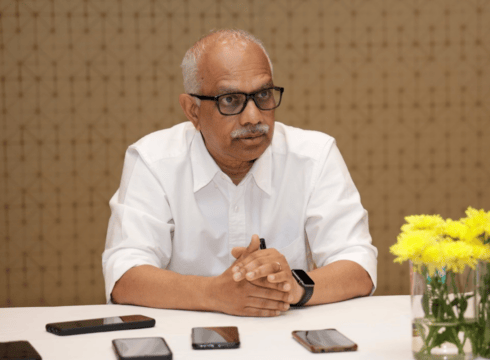iVP Semi will use the funds to set up testing facilities, build presence in India, scale up operations and fuel marketing initiatives
iVP Semi plans to set up a 20,000 sq. ft. “production test” facility in Chennai, which it plans to fully operationalise by October 2024
With an eye on sectors such as renewable energy and EVs, iVP Semi is eyeing a revenue of $70 Mn to $100 Mn in the next two to three years
Inc42 Daily Brief
Stay Ahead With Daily News & Analysis on India’s Tech & Startup Economy
Ex-Tessolve CEO Raja Manickam has announced the launch of his latest venture iVP Semi, a fabless semiconductor startup.
Simply put, a fabless chip company designs semiconductors and owns their intellectual property (IP) while outsourcing the manufacturing and packaging of these chips to other companies.
During the launch event, the startup also announced that it has raised $5 Mn as part of its Pre-Series A funding round from undisclosed investors. iVP Semi will use the funds to set up testing facilities and build presence in India.
A part of the capital will also be used to scale up operations and fuel marketing initiatives.
In a statement, the startup said that it will set up chip design centres in Chennai and Bengaluru and will licence product IP from Taiwan, Japan and the US. Additionally, the company will also undertake chip and module testing internally as against outsourcing it.
iVP Semi also said that it was “working” with the Tamil Nadu government to set up a 20,000 sq. ft. “production test” facility in Chennai, which it plans to fully operationalise by October 2024. As per the company, the Chennai unit will be equipped with capabilities for design, testing and certification.
iVP Semi also plans to set up a second testing unit at an undisclosed location in South India.
The startup also said that it will largely cater to clients in sectors such as renewable energy, electric vehicles (EVs) and automotive industries. iVP Semi claims to be eyeing a revenue of $70 Mn to $100 Mn in the next two to three years.
“…Our mission is to localise semiconductor chip production, empowering Indian companies to improve product development cycles and achieve greater technological autonomy. This approach not only ensures tighter control over the chip supply chain but also fosters an environment where semiconductor ecosystem partners are encouraged to establish a local presence…,” said Manickam.
Commenting on the launch, Ministry of Electronics and Information Technology (MeitY) Secretary S Krishnan said, “… iVP Semi plays an important role in creating demand to fill up the manufacturing capacity in wafer fab and OSAT (outsourced semiconductor assembly and test). I would like to congratulate iVP Semi on the creation of an Indian fabless chip company”.
iVP Semi is the brainchild of Raja Manickam, who previously founded and led semiconductor solutions company Tessolve. With 40 years of experience under his belt, Manickam is expected to leverage his expertise and networks in the space to further scale up his new venture.
iVP Semi will follow the suit of giants such as Nvidia, Qualcomm and Broadcom that outsource production to other companies while focussing on R&D internally.
The launch comes at a time when the demand for semiconductor chips continues to boom on the back of rising GenAI adoption and electronics.
Back home, both global and domestic giants including the Tata Group as well as US-based Micron Technology and CG Power have lined up to invest in the country to set up their fab plants. The pivot to India comes largely on the back of subsidies and sops offered by the Centre for spurring semiconductor manufacturing in the country.
While Tata Semiconductor Assembly and Test (TSAT) has set aside INR 27,000 Cr to set up a semiconductor packaging unit in Assam’s Morigaon, Micron is also building an ATMP facility in Sanand, Gujarat at estimated cost of INR 22,516 Cr.
At the heart of all this is the growing Indian semiconductor opportunity, which is projected to soar to a market size of $150 Bn by 2030.
Update | July 12, 12:35 AM: The story has been edited to update Raja Manickam’s designation as former CEO of Tessolve.
{{#name}}{{name}}{{/name}}{{^name}}-{{/name}}
{{#description}}{{description}}...{{/description}}{{^description}}-{{/description}}
Note: We at Inc42 take our ethics very seriously. More information about it can be found here.


